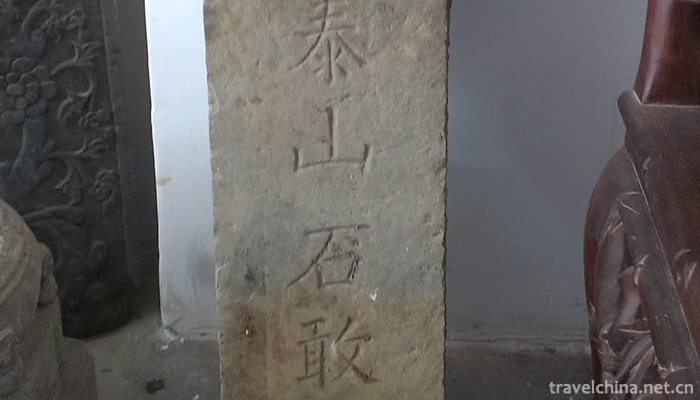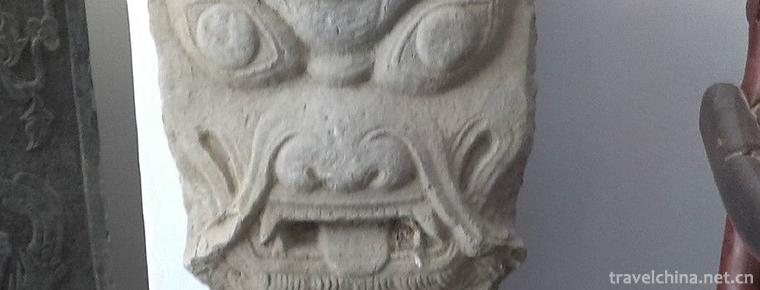Taishan Stone Dang Custom
Taishan Stone Dang Custom
Taishan Stone Dangdang Custom is a relic of ancient people's worship of spiritual stones. Mountain and stone are regarded as personality by myth, which is a typical traditional folk culture that has been spreading for a long time and has influenced vast areas in China. It belongs to the culture of town objects (avoiding evil things) in China. Shi Gangdang custom is widely distributed in many areas, with Taishan area in Shandong Province as the center, and gradually spread to all parts of the country (including Taiwan Province and minority areas) and to Japan, South Korea, Southeast Asia and overseas Chinese residential areas in East Asia and all over the world.
On May 20, 2006, Taishan Stone Dang Custom was approved by the State Council to be included in the first batch of national intangible cultural heritage list .
Festival History
Origin and development
The custom of Shi Gangdang originated from the worship of spiritual stones in ancient times. The earliest record of Shi Gangdang in the history books is the Emergency Chapter of the Western Han Dynasty: "Teachers and Tigers, Shi Gangdang, do not invade, Long Wei Yang." In Putian, Fujian Province, the Song Dynasty unearthed a stone inscription in the five years of the Great calendar of the Tang Dynasty. There were "Shi Gandang, Zhenbaigui, disaster-stricken rice seedlings, officials'blessing, people's health, fellow teachers' prosperity, ritual and music." Wang Yuyang recorded in "Chaxiang Room From Banknote" that "Qilu custom, more than the village entrance stone, carved Taishan stone dare to be five characters."
Shi Gangdang has gone through three stages: the early stage of its germination, the stage of its variation and the stage of its prosperity. After the Ming Dynasty, the belief of Shi Gangdang was closely combined with the worship of Mount Tai in Dongyue. It developed from "Shi Gangdang" to "Mount Tai Shi Gangdang", and its function also experienced the transformation from the earliest "town house" to "resolving evil spirit" to "curing disease", "door god", "eliminating evil spirits" and "preventing wind". Mount Tai has been regarded as a "town of matching heaven" since ancient times. The emperor of Dongyue in Dongyue Temple holds that it is the guerrilla of the town. And the town of Mount Tai is different from other mountains, it has great power, the town is the universe, so there is "Mount Tai is the world safe" theory. Because Mount Tai has the power of the town, so take a small stone from Mount Tai to settle down, of course, both ghosts and evil will flee. Shi Gangdang is associated with Mount Tai, and Gain is.
Historical Legends
In the course of historical evolution, the myth stories about Shi Gangdang have also been deduced into various versions.
Legend has it that in a village at the foot of Mount Tai there lived a brave man named Shi. He is brave and fearless. He is famous around Mount Tai. Some people were bullied, so they dared to find Stone to fight for them. One day, Shi dared to go to the city to sell firewood. He saw a notice posted outside the king's office: Who can descend demons for his family and wish to marry his daughter? It turned out that there was a thousand golden ladies outside the imperial court, who were "raised in a boudoir without knowing it", but unfortunately they were haunted by a goblin. Outside the imperial court, the goblin asked the old road of Niubi to set up an altar to catch the goblin, and they kicked the goblin off the altar and broke their head and bleed blood. Helplessly, they made a list for help. Shi dares to act bravely and resolutely. He hides his sword in the lady's room. When the goblin comes in, he raises his sword and shouts loudly: "Taishan stone dares to be here!" When the goblins listened, they fled in fear. After that, Wang personally sent the young lady to Mount Tai and took Shi Gang as a relative. The two young couples had a happy life. Who knows that after the goblins fled, they ran to other villages to scourge. When the villagers heard that Shi Gangdang could exorcise demons, they came to invite him. However, Shi dared to rush to the village, and the goblins ran to the village to make evil. Shi Gandang has no method of separation. What should he do? Later, the wise wife said to him, "Why don't you engrave your name on the stone tablet and put it on the house wall to control the demon?" As a result, people have carved the words "Taishan Stone Dang" on the stones, standing at the roots of the walls, streets, bridges, to rush to ensure the safety of the village house.
Manifestation
The main manifestation of Taishan Stone Dang Custom is that small stone tablets (or small stone people) stand on bridges and roads to be punched or built on the walls of houses, engraved (or books) "Stone Dang" or "Taishan Stone Dang" and other words, in order to suppress the ominous. This custom is very popular among the people. Its symbolic meaning is to express intangible ideas with tangible objects, to help people withstand all kinds of actual disasters and dangers, as well as psychological pressures brought by false gods and ghosts, and to overcome all kinds of inexplicable perplexities and fears. The folklore culture of town objects has a mysterious flavor of popular belief.
Inheritance Significance
The "auspicious and peaceful culture" embodied by Shi Gangdang of Mount Taishan reflects the general desire for peace and peace, and embodies the humanistic spirit and cultural creativity of the Chinese nation. Taishan Stone Dang Custom has lasted for thousands of years, mainly because it combines with the belief of "Chinese soul returns to Taishan", and also with the traditional folk beliefs and folk cultures of various places. On this premise, it has acquired the cultural traditions rooted in the relevant communities and groups and passed on from generation to generation. Shi Gangdang's belief is recognized by the vast area of China and many nationalities and spread abroad. It reflects the historical continuity of Chinese civilization from one side. Therefore, it has unique value to witness the vitality of Chinese traditional culture.
Shi Gangdang produced a large number of exquisite stone carvings and statues in the process of spreading in vast areas at home and abroad. They not only have aesthetic value and artistic value, but also are important historical relics. In the folk oral inheritance of Shi Gangdang's mythological stories and related operas and operas created by folk artists, the creativity of folk culture and art is fully demonstrated.
To excavate, rescue and protect the custom of Shidaring and to carry forward the peaceful culture embodied in it plays an important role in strengthening the cultural identity of the Chinese nation, promoting the great cause of the reunification of the motherland, and enhancing national unity and social cohesion.
Publicity platform
Taishan Stone Dangdang Cultural Festival
Mount Tai Shigangdang is the first batch of intangible cultural heritage announced by the State Council. Mount Taishan Shigangdang Cultural Festival is an important cultural activity of Mount Taishan International Mountaineering Festival. Every September, it is held at the foot of Mount Tai by Tai'an Civil Literature and Art Association.
The worship of Mount Taishan Stone Dang originated from the worship of the ancestors for the tools of labor and production experience. It is deeply rooted in the folk, and reflects the culture of Mount Taishan Fengchan. The common people's beliefs and the worship of emperors constitute the cultural connotation of Mount Tai of Guotai Min'an. Taishan stone dares to be spread all over the world in Chinese architecture. Its spiritual connotation of avoiding evil and hating martyrdom and praying for peace has become another bond of condensing the feelings of Chinese people around the world.
The Taishan Shidarang Cultural Festival, through the form of "catching up with the cultural collections", features a variety of interactive folk cultural experiences, such as watching grand operas, listening to music, watching exhibitions, inviting three treasures, playing extraordinary activities, painting and calligraphy, telling stories, playing games, drawing grand prizes and so on. Through the folk platform of "culture + tourism", people can enjoy their body and mind and remember their nostalgia.


-
1.Letinous edodes chicken Noodles
Letinous edodes stewed chicken originated in Northern Jiangsu
Time 2018-10-12 -
2.Yesanpo Scenic Area Laishui County Baoding
The Yesanpo Scenic Area of Laishui County, Baoding City, Hebei Province, is located in Laishui County, Baoding City. The Taihang Mountains and Yanshan Mountains
Time 2018-11-24 -
3.Uruwati Scenic Area
Uruwati Scenic Area is located in the upper reaches of Karakash River at the southern foot of Kunlun Mountains and in the territory of Langruxiang, Hetian County.
Time 2018-12-22 -
4.Xiantan Mountain Hot Spring Town
Xiantan Mountain Hot Spring Town is located in Xiwangzhuang Town, Zaozhuang City, Shandong Province. It is on the west side of Zaoji S345 Highway, south of Taierzhuang Ancient City, and on the side of
Time 2018-12-22 -
5.Yanxiangdong Ecotourism Area of Hanjiang River
Yanxiangdong Ecotourism Scenic Spot of Hanjiang River is located in Shiquan, covering an area of 80 square kilometers, north of Qinling Mountains and south of Bashan Mountains
Time 2019-01-13 -
6.Zhushan National Forest Park
Zhushan National Forest Park is located in Liuhua Po Street Office in the west of Qingdao Development Zone. It is a national forest park approved by the State Forestry Administration in December 2000
Time 2019-03-21 -
7.Changde silk string
Changde Silk String is a traditional local music popular in the Yuanjiang and Lishui areas of Changde, Hunan Province. At the end of Ming Dynasty and the beginning of Qing Dynasty
Time 2019-04-16 -
8.Maonan Fat Cover
"Fat set" is the general name of Maonan people's vow-making activities. It prevailed in the Ming and Qing Dynasties. At the beginning, Maonan people used Nuo rituals to sacrifice the heavens
Time 2019-05-27 -
9.Quwoqin Books
Quwo Qinshu is a kind of local traditional folk art form which was formed and mainly popular in Quwo County in the south of Shanxi Province and its adjacent areas of Shanxi, Shanxi and Henan provinces
Time 2019-06-11 -
10.Wudang Martial Arts
At the end of Yuan Dynasty and the beginning of Ming Dynasty, Zhang Sanfeng, a Taoist of Wudang School, established Wudang School and was respected as the founder of Wudang Wushu.
Time 2019-06-30 -
11.Guangyuan climate
Guangyuan City belongs to subtropical humid monsoon climate; it is located in the southern foot of Qinling Mountains, which is a transition zone between North and south. It has the characteristics of humid climate in the South and the characteristics of high sky
Time 2020-12-15 -
12.Suining Education
By the end of 2019, Suining had 911 schools of all levels and types, with 440000 students and 32000 full-time teachers. Among them, 196 primary schools enrolled 30600 students and 180600 students; 130 junior high schools, 28300 students and 78400 students
Time 2020-12-16